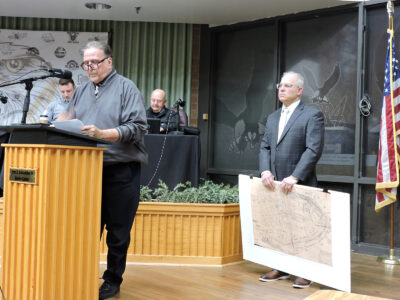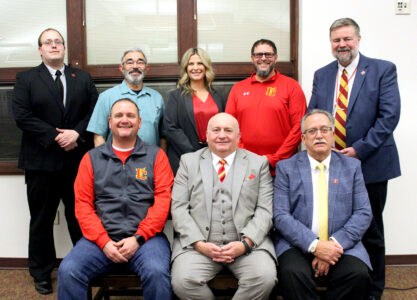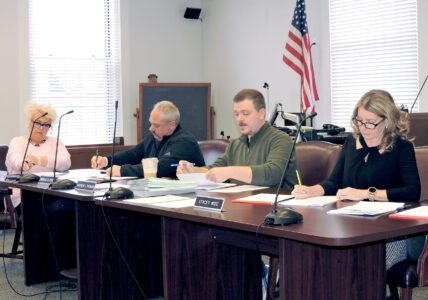Former U.S. Rep. Doug Applegate remembered
STEUBENVILLE — Jim Hart can’t help but chuckle when he remembers the time his boss, Doug Applegate, got caught ducking calls from the vice president of the United States.
It was 1993, and the Clinton administration was pulling out all the stops to get its budget bill passed. Applegate, in his final term in the U.S. House of Representatives, wasn’t a fan because it contained a provision calling for a tax on something called BTUs, or British Thermal Units, that he felt would have hurt his constituents, including some aluminum companies in Ohio’s old 18th District.
“When we found out it would hurt some companies and they might have to lay people off, he was opposed to that,” Hart said.
“So during the course of debate one day we got a call from Vice President Gore. I went in his office and told him Al Gore is on the phone. Doug told me, ‘I don’t want to talk to him, I know what he wants to talk about.’ So I went back and told his secretary, ‘I’m sorry he’s not in his office but I’ll tell him the vice president called.'”
The vice president called back a little later, and again Applegate refused to take the call. Hart made excuses for his boss again, though he remembers telling him, “this is getting embarrassing.”
“Later in the afternoon the president calls. I go into Doug’s office and said Bill Clinton’s on the phone, you’ve got to talk to him. He said, ‘Yeah, fine.’ I was in the room, it wasn’t a long conversation and at the end, Clinton said, ‘Thanks very much, Doug, I appreciate any consideration you can give me. And by the way, Al’s here and he would like to talk to you,'” Hart said, clearly enjoying the memory of a man he describes as a mentor and friend.
“There wasn’t a day in 18 years I didn’t want to go to work. It was a pleasure. Of course, Congress was a different place then. It was fun. I wanted to work hard, I wanted to work well for Doug, I took pride in it,” Hart, Applegate’s longtime administrative aide, said.
Applegate died Aug. 7 in Spring Hill, Fla., where he’d retired after leaving government service 27 years ago. He was 93.
The son of a former Steubenville mayor, Applegate had graduated from Steubenville High School in 1947 and became a licensed real estate broker before trying his hand at politics. He served 16 years in the Ohio Legislature – eight in the House and eight in the Senate – before fixing his attention on the halls of Congress: In 1976 he was elected to the U.S. House of Representatives, replacing the embattled Wayne Hays who’d been embroiled in a sex scandal.
During his tenure in Washington, Applegate championed the steel and auto industries, helped pass legislation to help veterans and improve health care for coal miners. He decried the U.S. Supreme Court’s 1989 decision upholding the rights of protesters to burn the U.S. flag, calling it the “greatest travesty in the annals of jurisprudence,” and in 1994 took heat when he cast one of the final two, deciding votes in the House to ban 19 types of assault weapons.
As he left office, Applegate said in a January 1994 news release he would “always be grateful for the support that I have received from so many people for such a long time.”
“As I look back on my tenure in the house, I think of the $450 million in federal project funds that I helped bring back to the district, the constituent service that I provided to anyone who came to me for assistance and, particularly, the opportunity I have had to help address the needs of America’s veterans,” he said.
“You won’t see his name on landmark legislation, but if you’re looking for a model to go by for a ‘constituent’s legislator,’ Doug Applegate is the one,” Hart said. “He cared about people, he cared about their problems. He always told me you don’t have to care about elections that much if you just do your job. That’s what guided him, doing the job the right way.”
Applegate “stuck to set principles that guided him from his days in the state Legislature, and I think people recognized that,” Hart said. “People recognized that he was just an honest guy – he wasn’t flashy, he didn’t look for headlines. He was just there to do his job. I think his motive was just to do a good job for the people of the 18th District and the country at large. All politics is local, but you’re there to do the best job you can for the district and the country at large.”
Former state Rep. Jerry Krupinski of Steubenville said he met the Congressman for the first time in 1968, when he was running for precinct committeeman in Adena. As his involvement with politics grew, so did his admiration for Applegate.
“As a person, he probably couldn’t have been nicer, he was personable,” Krupinski recalled. “And as a public servant, he was a peoples’ representative, for sure. He had something that any would be-politician dreams of having — a good memory for remembering names and faces. He was among the best for that.”
Applegate was an environmentalist, “that’s why he was helpful with clean air programs.”
When Krupinski was tapped to chair a select committee to draft Ohio’s response to the federal clean air act amendments, he said Applegate testified “and we ended up with one of the first cap-and-trade procedures in the country, due in large part to the information he provided.”
“He was a good person,” Krupinski said. “I looked up to him. And he was adamant about respect the flag. He was down on the Supreme Court — he could never understand why (they thought) defacing the flag should be protected by the First Amendment. He vehemently disagreed with the court for ruling as it did. That flag meant everything to him, he made no secret about it. It just opened his soul.”
His wife, Eileen Krupinski, recalled years ago when her husband had a stroke, “Doug came down late, late, late one night to the hospital to see Jerry, and he brought Jim Traficant with him, after hours.”
“He was a very caring person,” she said. “He always remembered people in the district–of course, it wasn’t as big then as it is now, but he was always good about coming around to different things and making himself known.”
She said people old enough to remember appreciate what Applegate did for the district.
“He was a genuine person, he cared about his constituents,” she said.
Former Steubenville Mayor Domenick Mucci remembers Applegate as “a special individual. When he walked in a room you really focused on him–his height, his stature, his knowledge.”
“He liked to go to as many events as possible,” Mucci said. “He felt talking to as many (constituents) as possible was the right thing.”
Mucci said one of Applegate’s most lasting achievements would have to be securing funding to help move construction of the U.S. Route 22 bypass forward.
“I believe that’s truly why Steubenville City Council took the opportunity to rename the connector ‘the Douglas Applegate Connector,” he said. “I knew he was honored by that. He was getting ready for the move to Florida, but he lived right off Lovers Lane and whenever he came back to the area he drove on a road named after him.”
He remembers Applegate was never at a loss for words, though he never had prepared remarks.
“He might have jotted down a line or two, a word or two, but he’d get up and go on in detail,” Mucci said. “He didn’t need a prepared script. He kept on top of just about every subject you can think of.”
He said Applegate was considered a friend of labor, “but he’d take the time to listen to both sides (so he could) make informed, intelligent decisions,” Mucci said. “He had an office at Ohio Valley Towers and he would see you whether you had an appointment or not. He was always accessible.
“And I know he loved this country,” he added. “He had a strong belief in family, in faith and in country, he served all three the same. He wanted to enjoy life, either playing golf or being out with his grandkids.”
Hart, who now lives in North Carolina, said it was a pleasure working with and for Applegate, “but Congress was a very different animal then, Democrats and Republicans got things done.”
“I remember Doug reaching across the aisle to get things done,” he said. “It was an atmosphere he really liked, working with people regardless of their political party. When he said something, the other side knew they could count on it. That’s something I learned from him, just being an honorable person.”
He said Applegate didn’t miss Washington.
“I know he didn’t. I kept in touch with him, I kept in close contact with him throughout the years. I don’t think he ever regretted leaving when he did.
“Politicians in general … get a pretty bad rap these days, maybe deservedly,” he added. “Doug didn’t. People didn’t always agree with him but he always had a good reason why he voted a certain way–to help the district or to not harm the district. He was truthful, there was never a hint of scandal around him. I think overall, he was recognized as a good, honest, decent person, and if you can do a job as good as Doug Applegate did his, you’ll be pretty successful.”
Applegate is survived by a son, Kirk. His wife of 69 years, Betty, died June 5, 2020, at the age of 89. A son, David, died on April 13, 2020, at the age of 65.





